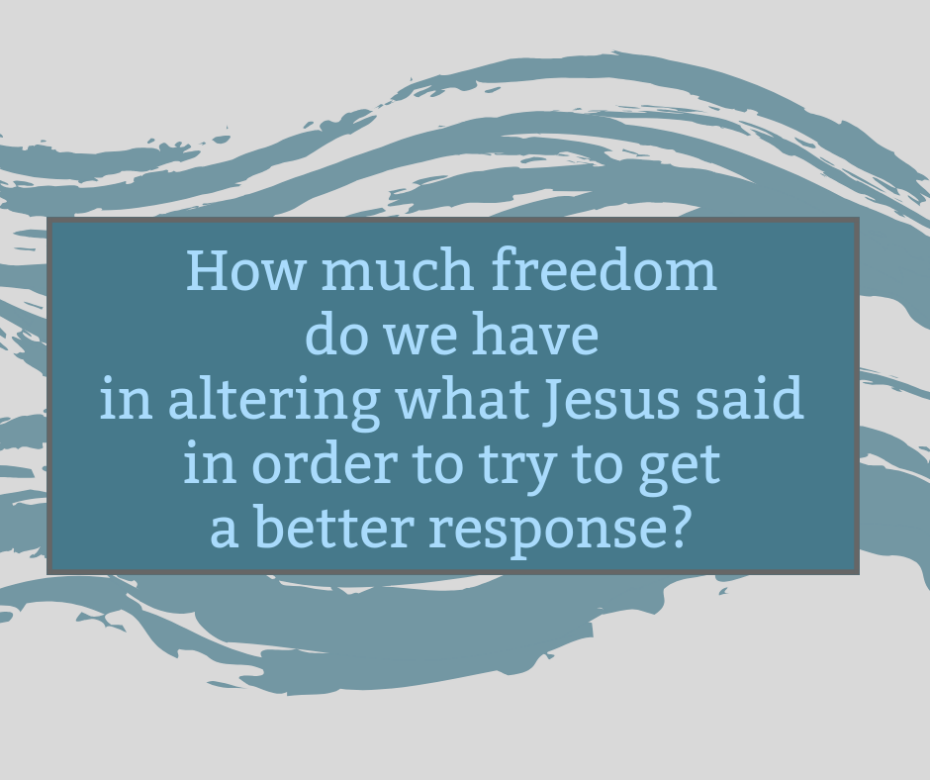Shawn was talking with a friend who takes online seminary classes. The man told Shawn he was a bit reluctant to raise Free Grace issues in his papers for class because the professor gives no indication that he is at all open to Free Grace Theology.
Shawn’s friend told him that the professor is also pastor of a certain church in Texas. I looked up the church and found the following statement about salvation:
How do I begin a relationship with Jesus and receive this new life?
According to the Apostle Paul . . . “By grace through faith” (Eph. 2:8-9). Grace can be defined as getting what you don’t deserve (i.e. a gift). We do not deserve the gift of forgiveness provided by Christ’s death in our place or the gift of righteousness (“right standing” with God) provided by Christ’s sinless life (2 Cor. 5:21). By confessing your sinfulness to God (Rom. 3:23), placing your trust in Jesus and what His life, death, and resurrection made possible for you (Rom. 10:9-10, 13, Eph. 2:8), you can begin a personal relationship with Him (John 3:16). We believe that when we begin that relationship, the Spirit of God enters our being – we call it the Holy Spirit – and that Spirit not only becomes our guide, but it continues the process that began at our point of surrender – moving us from a life of sin to a life where we resemble the person of Jesus!
I’m uncomfortable referring to the Holy Spirit as it.
Notice the last line where the statement stays, “it continues the process that began at our point of surrender.” Surrender? The statement thus far said nothing about surrender. Evidently believing in Jesus is in some sense a surrender. A little Lordship Salvation is thrown in, possibly so the statement appeals to everyone.
Another point of confusion is that the condition of salvation is stated as confessing your sinfulness to God and “placing your trust in Jesus and what His life, death, and resurrection made possible for you.” There is no mention here of the promise of everlasting life.
That brings me to my main concern. This statement talks about relationship three times. We read about “a relationship with Jesus,” “a personal relationship with Him,” and “we begin that relationship.” Not once does it mention everlasting life or the fact that that life (or that relationship) can never be lost.
Now it is true that the person who has everlasting life has a relationship with Jesus. It is an eternal relationship. (Of course, even unbelievers have a relationship with Jesus. He is Lord of all, including unbelievers [Matt 7:21-23; John 3:35; Eph 1:20-22; Rev 17:14]. He is Savior of the world, including unbelievers [John 1:29; 2 Pet 2:1]. One day every unbeliever will bow the knee before King Jesus.) But the verse the statement uses to prove that when we confess and trust, we have a relationship with Jesus is John 3:16 (see block quote above). Do you remember that verse? It does not use the words relationship with Jesus. It says “shall not perish, but has everlasting life.” Why not put the words that the Lord Jesus used. Is it really clarifying things for people to change everlasting life into “a personal relationship with Jesus”?
I am seeing this switch more and more, even within Free Grace circles. Instead of talking about everlasting life, the pastor talks about a relationship with Jesus.
Why do this? Why talk about a relationship with Jesus when what He promises is everlasting life, that is, life which can never be lost?
I think the reason is that talking about a relationship with Jesus is very non-controversial. People who believe you can lose your salvation like that terminology. People who believe you cannot lose your salvation have become desensitized to this expression. I imagine most people reading the statement above would not even notice that once saved, always saved is not indicated. I should mention this doctrinal statement is from a Southern Baptist Church.
I hope that in Free Grace circles we emphasize what the Lord Jesus emphasizes: everlasting life. Jesus never said, “He who believes in Me has a relationship with Me.” That is a man-made message. It may appeal to people. But it is not the message they need to hear. A person can believe that message and still not believe the promise of everlasting life. Keep it simple, saint.


